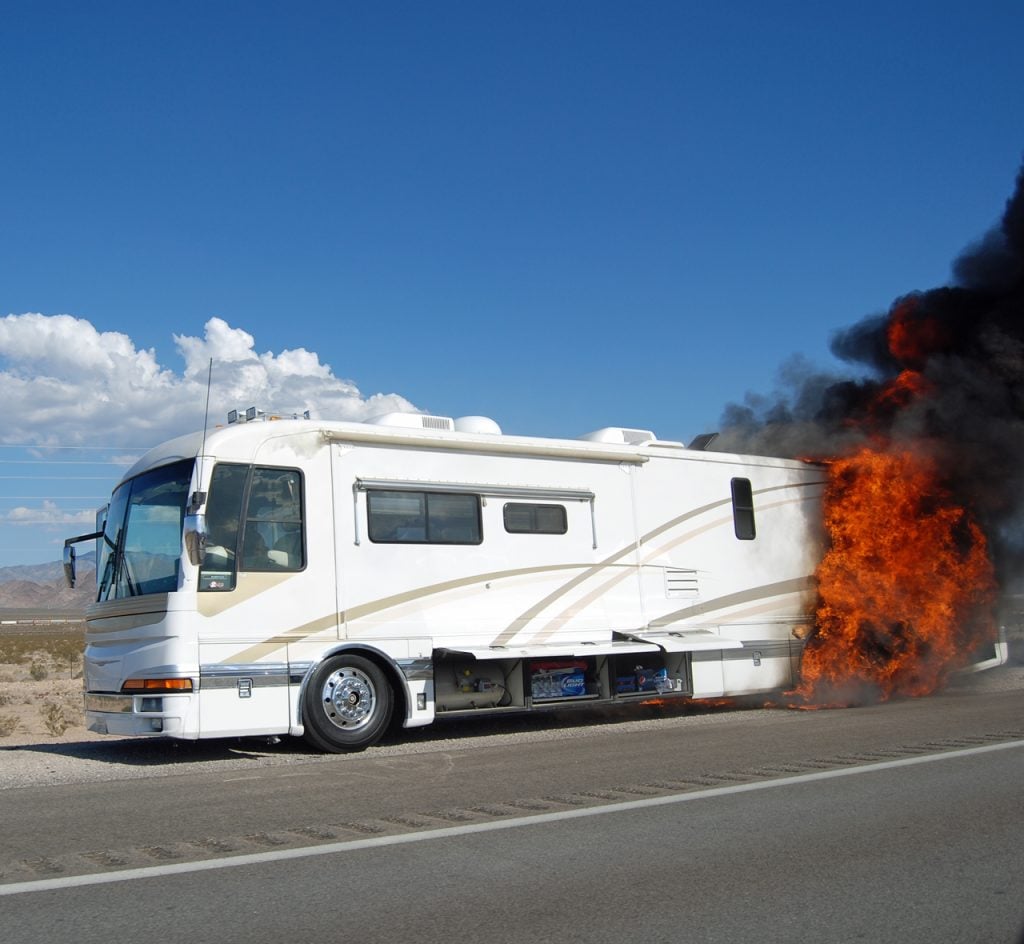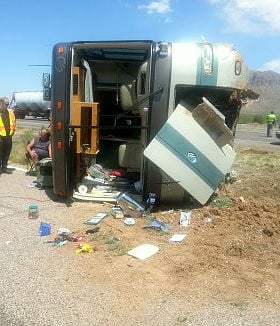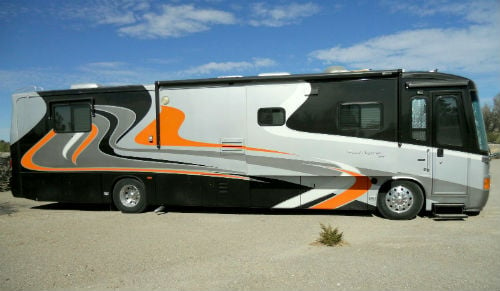If your home on wheels was totaled, how much can you spend to replace it? RV insurance isn’t exactly fun to research, but when you live on the road it’s imperative that you have adequate RV insurance total loss coverage.

Do you have total loss coverage? Photo by Eddie Maloney/Wikipedia
Eddie Maloney from North Las Vegas, USA, CC BY-SA 2.0, via Wikimedia Commons
The three main types of RV insurance total loss coverage
RV insurance plans costs and coverage varies depending on what you want to pay now in annual premiums, and what you can afford to pay later if the worst happens. Most RV insurance companies offer these three main loss protections.

When you go RVing, it’s imperative to have adequate RV insurance that covers all losses.
Actual Cash Value policies are the default level of protection available by RV insurance companies. If you have this type of policy and your RV is in a serious accident or worse, your provider pays what your RV is currently worth on the open market. Your deductible will be subtracted from the payment.
Actual Cash Value is bare bones protection but it’s not without merit. This coverage is the cheapest available. And for many full-timers who start out with older, used RVs, it’s often the only choice of RV insurance total loss coverage. If you fall into this category, building a hefty savings account is imperative. That way you can easily bridge the gap between your payout and a replacement rig.
Agreed value
Agreed Value is a step up in coverage. This is what I have for my Arctic Fox fifth wheel. If my RV is totaled, my insurance company will cover the RV amount that we “Agreed” on when the policy was written.
Unfortunately, not all RVs are eligible for Agreed Value protection. My RV insurance provider requires RVs to be less than five years old for these policies. If your RV qualifies, underwriters must review the bill of sale to approve of the amount you paid.
But let’s say you got a screaming deal on your RV and it’s worth more than the documented sale price. In that case, you’ll have to work with underwriters to find the real value (usually obtained through NADA Guides or an appraisal). Once everyone agrees on the dollar amount, that is what you’ll get (less your deductible) in the event of a total loss.
In a worst-case scenario, Agreed Value policies help you buy another RV of comparable quality. The downside of this coverage is you’ll pay annual premiums that cost more than Actual Cash Value policies.

Some RV insurance providers require RVs to be less than five years old for Agreed Value policies.
Full loss replacement
This is the Cadillac of total loss coverage for RVs and the sky-high premiums reflect it. Full Loss Replacement is usually only available on RVs less than one year old. If you obtain this coverage and you suffer a total loss, the insurance company pays out what it costs to buy a brand new RV. The replacement will be of similar make and model.
My provider will do this for the first five years of ownership. After that, insureds with this coverage must step down to Agreed or Actual Cash Value policies. Full-Loss Replacement is ideal if you can’t afford to replace your brand new RV. If you make RV loan payments, ask your agent if you can secure “Gap Coverage.” This protection also pays RV loans in the event of a total loss.
Nobody likes to think about RV catastrophes, but the more you get out in the world and travel, the greater the risk of encountering a mishap. Securing good full-timer RV insurance coverage for your needs lets you roam without worry. If you need a quote, you can visit RVerInsurance.com.

You said–
“My provider will do this for the first five years of ownership. After that, insureds with this coverage must step down to Agreed or Actual Cash Value policies.”
Please note my insurance company ( and I assume many others) automatically steps you down but doesnt step down the premium cost unless you talk to them and tell them to. My wife and I went 3 years beyond the 5 years step down before we learned we were still paying extra for the old replacement cost value. Result – we overpaid by almost $1000 a year. Great huh!! Thats what happens when you don’t study the fine print and or your company is as usual looking out only for their own pocket book (what else is new).
Len, thank you for commenting. I always learn from readers and this is super helpful information to know. Sorry you were overpaying but at least you’re not now. Thanks for sharing your experience so others can learn from it.
shallow thinking……it is your property so know how to take care of it instead of blaming others because you were less informed. Make regular contact and be an informed and responsible RV owner.
Thanks! Great information
I had a 1985 Airstrem Sauverion 25′ that was toast. I had an agreed value policy with Progressive for $12000. The adjuster agreed it was toast and they payd $12K no hassle. When I bought the trailer it was $8000. But with all he improvements I did it was worth $12000. I do recomended an Agreed Value policy with Progressive.
Tom
When we changed from fulltiming to part-timing 6 years ago (we bought a house again) I talked our insurer (Progressive) into let us keep virtually our same policy. But it changed from “full value” to “full original purchase price”. We still have mostly all the full-timer policy benefits along with the higher premium. But I figured it was worth a few hundred dollars a year to have the greatly increased coverage since we still use our coach for travel as well as going “south” for 5 months in the winter. They said they would not have done this if I was not already a “fulltime” policy holder for several years. Our coach is now almost 12 years old so I think this a “win” situation if folks can afford it.
Hank
We have a rent option agreement with the owner of this coach. We carried insurance, on it til Geico found we were living in it full time. Then they cancelled us. Any suggestions as to companies that we can call. We had road service as well. ?
Don’t believe the total loss agreement . They (Ins. co.), will do anything they can to avoid buying you a new, or, replacement RV. Even if they can get the thing duct taped back together for 1 dollar less than a replacement, it is a win for them.
We consider ourselves very fortunate. Had a total loss replacement policy with Nationwide and it was a major blessing. We did get a replacement, 2016, equivalent of 2015 with only 4K miles on it. The estimate to repair a Winnebago was more than it’s original cost, not to mention it would have been severely compromised. It is primarily in the hands of the body shop that insurance co directs you to use. We had a fabulous shop that did not even consider repair!!
Oh, and let me say that I DO recommend Nationwide! Takes a major amount of contacts with the company but you can get it done.
Donald,
I have only had Progressive since we went full-time/lived/now part-time in the MH from 2003 to the present. They are a big insurer (but not the only ones) for full-timers. No claim experience (whew..), but they do offer (last I heard) a “disappearing deductible” over 4 years – your deductible drops 25% per each year you have no claim. I believe Good Sam has an option if your rig is parked for a period of time they will reduce your premiums. Two good web sites to search are rv.net (the biggest site in the universe) and escapees.com (a club that does a lot of support for full and part-timers). You can search either one without a login. You need a login to post on rv.net (no big deal). You have to belong to the Escapees RV Club to post on their forum.
You can search on either site for other insurers. rv.net is very responsive; lots of users.
Progressive seems to be a company that takes care of the customers. I have only had one claim with them. They were concerned about one thing and one thing only, me!! My coach is a 2003 bounder, that has been upgraded to accommodate all of the comforts that I enjoy at home. I mean everything!!! Except I don’t have a lawn to mow.
We just had a tree fall on our Class A diesel coach. We have Purchase Price Coverage. A huge tree fell dead center of our coach destroying the entire roof and water came flooding in. It’s been 17 days, and the Nationwide insurance adjuster has lied to us. In our state 75% of value before total loss. We saw the walls retract when the tree hit. It broke and the top and trunk 11″ in diameter and over 72′ long fell dead center of our coach from about 100′ high. The impact was astounding. Roof, air conditioners, slide outs, destroyed, and we won’t know the extent of the damage. I immediately called every repair shop in the southeastern US and sent videos and pictures, and not one said they would attempt to repair it. They all said they would total it. We found out our insurance adjuster has lied to us and is calling around trying to find anybody who will repair it to keep it under under 75% of cash value. She lied saying they couldn’t find a tow truck for our coach. Didn’t care if it rained in it or whatever. We found out after days that a tow truck could have been at the campsite in less than an hour but would charge $5500 to tow it. We sent her great videos and pictures and she said she turned it all into the “repairability” team. We found out she has the authority to total the coach herself. Every day, we have to call her to know anything, she tells us we will know before the day is over, and then nothing. Any advice? I’ve told her I’ve talked to all of these repair places and she is calling around trying to make deals, so she isn’t interested in who I talked with.
Has anyone considered self insuring?
If you own the rig outright (paid-off) why not take those premiums and place them into a savings account? I recognize the gamble but the payoff is statistically there.
You are guaranteed that 100% of your premiums will be available for replacement. In the statisticly inlikely event that something happens.
This is the option we are taking as full timers.
We purchased what we could afford (31′ fifth wheel). The unit is 5 years old but showed no signs of any use. Before we hit the road we have committed to a cash reserve that will remain untouched. We intend to “self insurance” into this account to increase our emergency RV savings. In a few years we will have the option of upgrading (used of course).
If something happens to our rig along the way we will make appropriate decisions at that point. But we will have the cash on hand to make sound decissions and not be “stuck” or at the mercy of our insurance companies whims.
Not sure if this would be practical for a 100K rig but I am assuming that anyone owning a 100K rig has substantially greater financial resources than we do. Might be practical after all.
Shopping and owning within our means allows us significant options.
just food for thought!
Hi Chris, thanks for reading and your suggestion to self-insure. As someone who’s committed to being debt-free for life, I agree that if someone is disciplined enough to stash that money before hitting the road, it can work in their favor. But here’s something to consider…
We own our rig outright, but if we wanted to self-insure the fifth wheel at it’s Agreed Value of $29,000 and the Dodge at current market value of $20,000, with our current premiums it would take us almost 4 years to put that amount of money into savings. Could we do it faster? Not likely. A lump sum windfall would make it possible much sooner, say from the sale of a property. But I still don’t see how financially it makes sense. I’m guessing there’s a number cruncher out there who can determine where the break even point is, between the low amount of interest earned on stashing those amounts into savings over four years, versus the depreciation on the RV. That bean counter isn’t me, but personally I’d rather put my energy and cash toward our retirement fund and emergency savings.
Happy Travels! Welcome to the road (saw your blog 🙂
Would love some 2018 updates as I saw on another blog post that Progressive is no longer insuring vintage travel trailers for actual replacement value or agreed-upon value, even with an appraisal. Can anyone else verify this? If so, are there still other insurers who are – like Nationwide? Thanks!
Progressive seems to be a company that takes care of the customers. I have only had one claim with them. They were concerned about one thing and one thing only, me!! My coach is a 2003 bounder, that has been upgraded to accommodate all of the comforts that I enjoy at home. I mean everything!!! Except I don’t have a lawn to mow.
We currently have GAP insurance with our RV. Is it recommend to also get the “Full loss replacement” if we can afford it or are they the same thing?
What’s happens to the unit after the insurance totals it who keeps it?
Question: we have progressive. Our RV is a total loss thanks to Hurricane Ian in SW Florida. My policy says Actual Cash Value. Google says this is determined by the NADA values. Progressive is saying they pay the ‘rate bases’ which is what we paid for it, not what we could have sold it for or what it’s worth is calculated on NADA. Is this how this works? We have not settled with them yet.
So according to what is stated above… an RV that is more than 5 years old cannot be properly insured! I just had a 2003 Shasta Revere Class C (30’) totaled due to extreme flooding during a storm. I paid $18000 2 rears ago and my insurance company is offering me $4000 ( book value. I am now trying to insure my next one properly and am finding it impossible!! How is this fair to those who can’t afford a new $100,000 RV?!? It’s not always about being educated about insurance as some here have suggested.